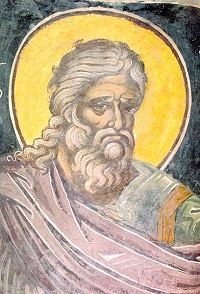|
|
The Septuagint is the Old Testament as used by the Apostles and all the Ancient Church
 |
Elpenor's Bilingual (Greek / English) Old Testament |
Page 4: Introduction to the Septuagint Old Testament
(The testimony of Evangelical Converts)
Along with Sparks, Walker was one of six founding members of a group that called themselves the New Covenant Apostolic Order, and later, the Evangelical Orthodox Church. The men were evangelical Protestant pastors and teachers in the 1960s and 1970s, some working for Campus Crusade for Christ.
Stirred by the sense that something was missing in their worship, the six men cooperatively began a search into Christianity’s roots and history that led them, along with about 2,000 other evangelicals, eventually to embrace Orthodoxy, a journey that was chronicled in Peter Gillquist’s 1989 book, “Becoming Orthodox.”
“The idea for a study Bible popped up relatively early in our journey,” Walker said. “Every single one of us had used the Scofield Reference Bible, an excellent reference Bible for Protestant evangelicals. Once we were convinced that we were going to become Orthodox, we began to talk about an Orthodox study Bible.”
For this complete edition, Morris contributed study notes on the book of Isaiah. “It took a long time,” Morris said. “It’s an important book of the Old Testament, with so many Messianic prophecies.” It also includes notes he contributed for the book of Romans that had been in the earlier edition, as well as the glossary he developed, which has been retained and updated.
Yancey writes, “When we read the Old Testament, we read the Bible Jesus read and used.” “The early Christian church used the Greek version of the Scriptures,” Morris said in an interview in his study at St. George. “This Greek version was called the Septuagint, for the Greek word for ‘70,’ the number of scholars Ptolemy hired about 200 or 300 B. C. to translate the Hebrew Scriptures into Greek.”
As Yancey notes, New Testament writers often drew upon the Old Testament in quotes and allusions. Nearly all of those references, Morris said, came from the Septuagint. “That’s why the Septuagint is important to Orthodox Christians — because it was used by the original Christian church.”
“The Septuagint was a good strong anchor for theologians and scholars to determine, what was the Bible really like in apostolic times” the Rev. Dr. Gordon Walker, emeritus priest at St. Ignatius Antiochian Orthodox Church in Madison, Tenn. said in a telephone interview. “In the New Testament, all but six of the Old Testament quotes that were used came from the Septuagint.” New Testament writers quoted Scripture more than 200 times, he said. The other six references were taken from Aramaic and Hebrew texts available at the time. (Vicksburg Post - Vicksburg, MS)
Read about the texts witnessed only in the Septuagint:
Letter of Aristeas (including also full text in Greek and English) ||| Sirach, Wisdom, Letter of Jeremiah ||| Maccabees 1, 2, 3 and 4 ||| Additional texts witnessed by the Septuagint to the book of Daniel ||| 1 Esdras, Psalm 151, Prayer of Manasseh ||| Judith, BaruchNote that the so called 'sixth' chapter of Baruch in the Septuagint is published separately as Letter of Jeremiah. Check also this note about the Order of Septuagint Psalms and the Masoretic.
Cf. in print The Septuagint Old Testament in English, Greek English Lexicon of the Septuagint, Grammar of Septuagint Greek, The Use of the Septuagint in New Testament Research, More
Reference address : https://ellopos.net/elpenor/greek-texts/septuagint/default.asp?pg=4